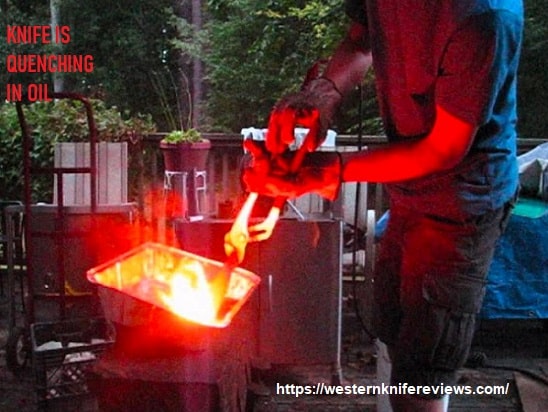The method of knife making must include a quenching process. It is certainly one of the crucial steps that have to be done while operating heat treatment of blade materials. However, quenching is the process of rapid cooling according to materials science.
Generally, blacksmiths use oil or water to obtain this process. Sometimes, blacksmiths also use compressed air for quenching. Nonetheless, quenching is done to obtain some modification of the metal properties. Like it is done to bring hardness, toughness, or strength to the metal.
Quenching helps to reduce a certain amount of temperatures the metal endures after heat treatment. That is how it also prevents several faults that could occur.
Quenching is scientifically proved to be important. So, let’s explore everything about this topic.
What is Knife Quenching Oil?
However, the compounds in quenching oil can vary depending on the project where it would be used. For making a knife, quenching oils may have different kinds of properties. The substance helps to increase the wettability of steel. It helps in preventing cracks.
Most steels that are used for knife-making purposes are rated generally for oil quenching. Quenching oil works faster than air and to some extent even compressed water.
How Does Knife Quenching Oil Work?
Generally, quenching oil has to operate two initial functions. First of all, it hardens the metal components by managing the heat during the process of quenching.
And secondly, the oil increases the wetting of metal components to avoid unwanted conditions.
Let’s get to the stages where quenching oil works.
First, the vapor stage
In this stage, the metal for a blade is submerged in the oil. Also, the components of the material get covered with a vapor blanket. This stage has to be very short because there are chances that a longer vapor stage might leave soft spots.
However, the cooling in this stage is quite slow. Again, the heat removing process also requires time and tactics. That is why many blacksmiths use additives to be done with this stage quickly.
Second, the boiling stage
When the vapor stage is over, the boiling stage comes. When the material is cooled, all the vapor blanket also dissipates along with it. It nucleates the boiling. The boiling stage transfers heat in the fastest way.
However, the rate of heat transfer depends on the molecular composition of quenching oil.
Lastly, the convective stage
It is the last stage of the quenching method where quenching oil is also required. Nonetheless, to occur this stage, the temperature of the oil-component interface gets lower. It even gets below the boiling point of the oil.
Moreover, here the speed of heat transfer depends on the viscosity of the oil. Again, oil’s viscosity is to some extent, dependent on the oil decomposition degree.
Therefore, it is to say that, the lower the oil viscosity, the higher the rate of heat transfer. So, they are inversely proportional to each other. Nonetheless, the viscosity of an oil is directly proportional to its decomposition.
Benefits of Using Knife Quenching Oil
- Quenching oils are quick in transferring heat without causing any remarkable falsification or distortion.
- Though some water-based caustic quenchants are faster in heat transferring yet, their severity hurts the materials. These quenchants can even crack or distort them. So, compared to them, quenching oil does not go rough in the process and also, does not cause any cracks.
- Moreover, to talk about adjustability. Nothing does better than quenching oils. They are very adjustable.
- Quenching oils also work well with additives. Their different properties like temperature, viscosity, and decomposition are easily modifiable by adding the proper additives.
- Again, quenching oils can be controlled well. They are also versatile enough to streamline the whole process of metalworking.
Best Quenching Oil For Knives
Generally, different grades of steel require different properties in quenching oil. Thus, determining the best oil for knife quench is a bit tough. Also, since the quenching process is not universal for all metal types, all processes will not require the same properties in the oil.
Thus, depending on the particular alloy or steel, the properties of quenching oil should be selected. It is important because alloys or steels boast different temperatures for starting. Moreover, they also have different cooling rates.
So, different steels and alloys will promote different rates of uniformity. And their finished product quality will also be different. Therefore, blacksmiths use oils that will be the best suited for the metals they are using for making a knife.
Things to Consider When Buying Quenching Oils
-
Budget
Quenching oil costs. So, while buying them set your budget first.
-
Speed Rate
This is a very important physical property. Different steel materials require different quenching speeds.
-
Viscosity
The viscosity of oil can either accelerate or can decelerate the heat transfer step. So, choose the oil that has a lower viscosity.
-
Water Content
The water content of the oil is also another property to consider while buying oil for quenching. It affects the quality and finishing of the knife. thus, look for oil that has less than two percent water content.
-
Environmental Effect
It determines which one is the best quenching oil. The best ones last years. Whereas, the poor-quality ones are affected by environmental elements very soon.
Some Blacksmith Quenching Oils
There are many. However, the most used ones are,
- Food-grade oils
- Motor oils
- Mineral and transmission oils
- Specialized quenching oils
Final Words
So, now you can see that quenching oil is the ultimate key to a successful quenching process. To make your knife blade more stable, tough, and longer-lasting, there are no alternatives for quenching.
However, no quenching oil will bring you a hundred percent satisfaction. The process is mostly dependent on the skill of the blacksmiths as well.
Nonetheless, you have several options for quenching oil. Thus, select the best one for you to get the best knife!

